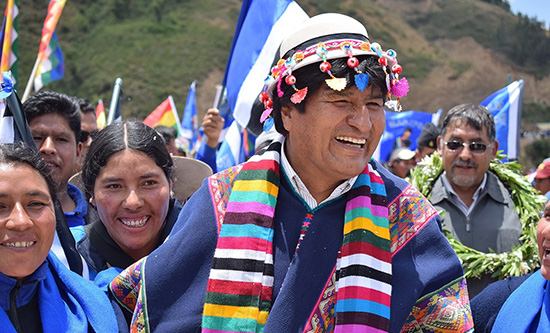
While a wave of imperialist-backed reaction has swept across Latin America in the last decade, encompassing Argentina, Brazil, Colombia and Ecuador to name just a few, Bolivia remains a beacon of hope for progress in Latin America, a staunch ally of those the United States attacks as a ‘Troika of Tyranny’ – Cuba, Venezuela and Nicaragua. President Evo Morales, leader of Movement Towards Socialism (MAS) will be seeking a fourth term in office in October’s presidential election. Morales, the country’s first indigenous president, is currently leading in opinion polls and is expected to win with a comfortable majority. MAS has won every election since 2005, and in the primary election in January Morales received 36.54% of the votes, compared to 7.10% for his closest rival. However, the United States – which since 2002 has spent $97m funding opposition groups – is increasing efforts to undermine him in favour of the right-wing candidate, former president Carlos Mesa, who cosied up to the US during his presidency and was vice president when the state killed 60 people during the gas war of 2003.
Morales’ opponents argue that standing for a fourth term is in breach of the constitution. This follows a referendum in February 2016 asking if presidential term limits should be removed, which the government narrowly lost. US state funds, channelled through NGOs, were used to fund the ‘no’ campaign, while the USAID-backed InterAmerican Institute for Democracy provided strategic planning. However, a year later, MAS appealed to the high court, which approved the removal of term limits for elected officials, allowing Morales to legitimately run again and ensure the continued transformation of the conditions of the Bolivian working class. In June 2019, the US Congress reiterated its call for Morales to step down. The Republican senator Ted Cruz said: ‘While Bolivia aligns itself with rogue and authoritarian regimes, including Venezuela and Russia, it’s imperative for the US to underscore the importance of term limits, and the value of peaceful transfers of power.’ The point is clear: a socialist president in Bolivia is a threat to US imperialism.
13 years of social justice
MAS emerged out of radical movements in the streets, slums and unions, and in the 13 years since it won power it has come ‘to represent the crystallisation of the deep-seated resentment, not just at privatisation, but of 500 years of colonialism, social exclusion and a neoliberal democracy that wasn’t able or willing to meet people’s basic needs’ (TeleSur English, 23 January 2019). The number of people living below the poverty line has been halved, inflation has fallen to just 1.5% and Bolivia’s economy is the fastest-growing in the region.
Bolivia has been able to do this by rejecting the IMF’s stranglehold and nationalising key, strategic industries such as gas production and lithium extraction, providing the state with the means to invest in social programmes, transport, manufacturing, infrastructure and industrialisation. Some mining facilities have also been renationalised. Speaking at the Departmental Encounter in Cochabamba in early June, Morales stated that ‘the departmental encounters are for the people to decide their destiny; the people decide their future, the people decide the hope of future generations’. Profits have been directly invested back into the country, allowing Bolivia to provide the people with decent homes, healthcare and education. It also, in 2011, became the first country in the world to introduce legal protections for the environment on a par with rights protecting human beings. In April this year it announced new renewable energy projects. In June, Morales declared ‘Capitalism is like a cancer for Mother Earth’.
In May the government announced that between 2006 and 2018, 151,058 people received public housing, and in July Morales launched a new social housing initiative to provide free housing to single mothers with more than two children. Since Morales came to power, the ‘Mi Salud’ programme, which operates with the support of Cuban doctors, has been running in the poorest and most isolated rural areas including the Andean and Amazonian regions, providing 16.4 million free health appointments and 700,000 free eye surgeries as part of Cuba’s ‘Operation Miracle’ across Latin America. Enrolment of primary school children has more than doubled to over 70%.
US-backed opposition protests
In early July protests were held in the city of Santa Cruz, the stronghold of the wealthy opposition, to oppose Morales running again. Despite these protests being supported by all the main opposition candidates, they were only able to block one road and even El Deber, the largest pro-opposition media outlet in the city, reported that ‘all public sector workers and services are operating normally without any staff absences’. Bolivia’s indigenous campesino union, the biggest social movement in the country, condemned the protests as a ‘total failure’ as did the main Labour union federation. One MAS politician and former union leader, David Ramos, said: ‘It is not a mobilisation for popular or social demands, it is a political mobilisation whose aim is to destabilise, conspire and boycott the democratic system in our country.’
Meanwhile, Carlos Mesa, the main opposition presidential candidate from the Citizens Community (CC) party, has received $10m in funding from unknown sources in the US. Diego Ayo, CC spokesman and a former employee of USAID, claimed the money had been collected at charity festivals and from private individuals. Mesa claims Ayo was lying and has denied his campaign received any money at all.
Such rare revelations are only the tip of the iceberg. It is clear that US imperialism will step up its covert financial and political support for the opposition in the run-up to October’s election in an attempt to overturn the massive gains made by the Bolivian working class under Morales in the last 13 years.
Cassandra Howarth
Fight Racism! Fight Imperialism! No 271, June/July 2019




